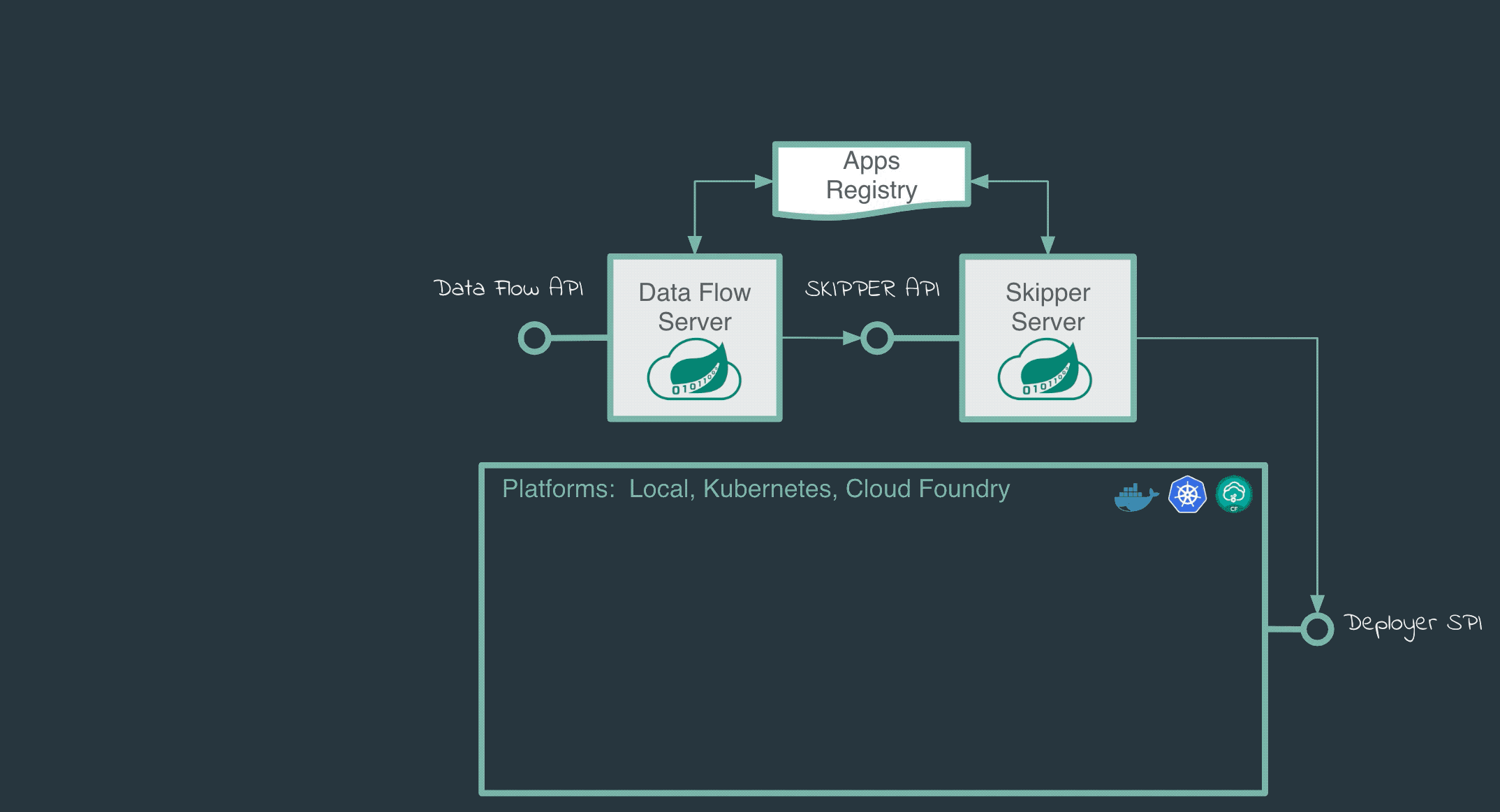Continuous Delivery of Streaming Applications
The applications composed in the streaming data pipeline may often need to be changed. The change can be a new version of the application that fixes a bug or that sets a different value of an application property. To avoid downtime from stream processing, we would like to do a rolling upgrade of only the applications in the stream that have changed. Furthermore, should the upgrade not be what is desired, a quick rollback to a previous version of the application should be easy to perform.
Spring Cloud Data Flow provides support for continuous delivery of event streaming applications through the Skipper server.

To demonstrate this, we can use some of the out-of-the-box streaming applications that were already registered when installing Data Flow.
Local
This section describes how to use continuous delivery in a local environment.
Stream Creation and Deployment
In this section, we create and deploy:
- A stream that has a source that ingests
httpevents - The
transformprocessor that applies a transformation logic - The
logsink that shows the result of the transformed events
In the following stream definition, you can provide unique server ports for each of the applications as they get to deploy on local:
stream create http-ingest --definition "http --server.port=9000 | transform --expression=payload.toUpperCase() --server.port=9001 | log --server.port=9002" --deployYou can verify that a stream is in the process of being deployed from the stream list command:
stream listThe output should be similar to the following listing:
╔═══════════╤══════════════════════════════════════════════════════════════════════════════════════════════════════════════════════════════╤═════════════════════════════╗
║Stream Name│ Stream Definition │ Status ║
╠═══════════╪══════════════════════════════════════════════════════════════════════════════════════════════════════════════════════════════╪═════════════════════════════╣
║http-ingest│http --server.port=9000 | transform --transformer.expression=payload.toUpperCase() --server.port=9001 | log --server.port=9002│The stream is being deployed.║
╚═══════════╧══════════════════════════════════════════════════════════════════════════════════════════════════════════════════════════════╧═════════════════════════════╝Once the stream has been deployed, you can run the command again:
stream listThe output changes to indicate that the stream has been deployed:
╔═══════════╤══════════════════════════════════════════════════════════════════════════════════════════════════════════════════════════════╤═════════════════════════════════════════╗
║Stream Name│ Stream Definition │ Status ║
╠═══════════╪══════════════════════════════════════════════════════════════════════════════════════════════════════════════════════════════╪═════════════════════════════════════════╣
║http-ingest│http --server.port=9000 | transform --transformer.expression=payload.toUpperCase() --server.port=9001 | log --server.port=9002│The stream has been successfully deployed║
╚═══════════╧══════════════════════════════════════════════════════════════════════════════════════════════════════════════════════════════╧═════════════════════════════════════════╝Post some data from the Spring Cloud Data Flow shell:
http post --target "http://localhost:9000" --data "spring"From the log file of the log application, you should see the following:
log-sink : SPRINGThe stream manifest http-ingest command shows all the applications and their properties for this version of the stream:
stream manifest http-ingestYou should see a result similar to the following:
"apiVersion": "skipper.spring.io/v1"
"kind": "SpringCloudDeployerApplication"
"metadata":
"name": "http"
"spec":
"resource": "maven://org.springframework.cloud.stream.app:http-source-rabbit:jar"
"resourceMetadata": "maven://org.springframework.cloud.stream.app:http-source-rabbit:jar:jar:metadata:3.2.1"
"version": "3.2.1" "applicationProperties":
"spring.metrics.export.triggers.application.includes": "integration**"
"spring.cloud.dataflow.stream.app.label": "http"
"spring.cloud.stream.metrics.key": "http-ingest.http.${spring.cloud.application.guid}"
"spring.cloud.stream.bindings.output.producer.requiredGroups": "http-ingest"
"spring.cloud.stream.metrics.properties": "spring.application.name,spring.application.index,spring.cloud.application.*,spring.cloud.dataflow.*"
"server.port": "9000"
"spring.cloud.stream.bindings.output.destination": "http-ingest.http"
"spring.cloud.dataflow.stream.name": "http-ingest"
"spring.cloud.dataflow.stream.app.type": "source"
"deploymentProperties":
"spring.cloud.deployer.group": "http-ingest"
---
"apiVersion": "skipper.spring.io/v1"
"kind": "SpringCloudDeployerApplication"
"metadata":
"name": "log"
"spec":
"resource": "maven://org.springframework.cloud.stream.app:log-sink-rabbit:jar"
"resourceMetadata": "maven://org.springframework.cloud.stream.app:log-sink-rabbit:jar:jar:metadata:2.1.1.RELEASE"
"version": "2.1.1.RELEASE" "applicationProperties":
"spring.metrics.export.triggers.application.includes": "integration**"
"spring.cloud.dataflow.stream.app.label": "log"
"spring.cloud.stream.metrics.key": "http-ingest.log.${spring.cloud.application.guid}"
"spring.cloud.stream.bindings.input.group": "http-ingest"
"spring.cloud.stream.metrics.properties": "spring.application.name,spring.application.index,spring.cloud.application.*,spring.cloud.dataflow.*"
"server.port": "9002"
"spring.cloud.dataflow.stream.name": "http-ingest"
"spring.cloud.dataflow.stream.app.type": "sink"
"spring.cloud.stream.bindings.input.destination": "http-ingest.transform"
"deploymentProperties":
"spring.cloud.deployer.group": "http-ingest"
---
"apiVersion": "skipper.spring.io/v1"
"kind": "SpringCloudDeployerApplication"
"metadata":
"name": "transform"
"spec":
"resource": "maven://org.springframework.cloud.stream.app:transform-processor-rabbit:jar"
"resourceMetadata": "maven://org.springframework.cloud.stream.app:transform-processor-rabbit:jar:jar:metadata:3.2.1"
"version": "3.2.1" "applicationProperties":
"spring.metrics.export.triggers.application.includes": "integration**"
"spring.cloud.dataflow.stream.app.label": "transform"
"spring.cloud.stream.metrics.key": "http-ingest.transform.${spring.cloud.application.guid}"
"spring.cloud.stream.bindings.input.group": "http-ingest"
"transformer.expression": "payload.toUpperCase()"
"spring.cloud.stream.metrics.properties": "spring.application.name,spring.application.index,spring.cloud.application.*,spring.cloud.dataflow.*"
"spring.cloud.stream.bindings.output.producer.requiredGroups": "http-ingest"
"server.port": "9001"
"spring.cloud.dataflow.stream.name": "http-ingest"
"spring.cloud.stream.bindings.output.destination": "http-ingest.transform"
"spring.cloud.dataflow.stream.app.type": "processor"
"spring.cloud.stream.bindings.input.destination": "http-ingest.http"
"deploymentProperties":
"spring.cloud.deployer.group": "http-ingest"For instance, you can see the transform application has the "transformer.expression": "payload.toUpperCase()" property.
The stream history http-ingest command shows the history for this event stream, listing all the available versions:
stream history --name http-ingestThe output of that command should resemble the following listing:
╔═══════╤════════════════════════════╤════════╤════════════╤═══════════════╤════════════════╗
║Version│ Last updated │ Status │Package Name│Package Version│ Description ║
╠═══════╪════════════════════════════╪════════╪════════════╪═══════════════╪════════════════╣
║1 │Wed May 08 20:45:18 IST 2019│DEPLOYED│http-ingest │1.0.0 │Install complete║
╚═══════╧════════════════════════════╧════════╧════════════╧═══════════════╧════════════════╝Stream Update
If you want to update the existing deployed stream to use a different version of the log application, you can perform a stream update action.
First, you can register the required version of the log application:
app register --name log --type sink --uri maven://org.springframework.cloud.stream.app:log-sink-rabbit:3.2.1Then you can perform the stream update, as follows:
stream update --name http-ingest --properties "version.log=3.2.1"When the stream update is run, you can run:
jpsThen you can see that the log application log-sink-rabbit-2.1.0.RELEASE.jar gets deployed and that the existing log-sink-rabbit-2.1.1.RELEASE.jar is destroyed.
Once the stream update is completed, you can verify the stream manifest to see if the version of the log application is changed:
stream manifest http-ingestYou should see output similar to the following listing:
"apiVersion": "skipper.spring.io/v1"
"kind": "SpringCloudDeployerApplication"
"metadata":
"name": "log"
"spec":
"resource": "maven://org.springframework.cloud.stream.app:log-sink-rabbit:jar"
"resourceMetadata": "maven://org.springframework.cloud.stream.app:log-sink-rabbit:jar:jar:metadata:3.2.1"
"version": "3.2.1" "applicationProperties":
"spring.metrics.export.triggers.application.includes": "integration**"
"spring.cloud.dataflow.stream.app.label": "log"
"spring.cloud.stream.metrics.key": "http-ingest.log.${spring.cloud.application.guid}"
"spring.cloud.stream.bindings.input.group": "http-ingest"
"spring.cloud.stream.metrics.properties": "spring.application.name,spring.application.index,spring.cloud.application.*,spring.cloud.dataflow.*"
"server.port": "9002"
"spring.cloud.dataflow.stream.name": "http-ingest"
"spring.cloud.dataflow.stream.app.type": "sink"
"spring.cloud.stream.bindings.input.destination": "http-ingest.transform"
"deploymentProperties":
"spring.cloud.deployer.count": "1"
"spring.cloud.deployer.group": "http-ingest"
---
...
...Similarly, you can use the stream history command to see the history of your actions:
stream history --name http-ingestThe output should resemble the following listing:
╔═══════╤════════════════════════════╤════════╤════════════╤═══════════════╤════════════════╗
║Version│ Last updated │ Status │Package Name│Package Version│ Description ║
╠═══════╪════════════════════════════╪════════╪════════════╪═══════════════╪════════════════╣
║2 │Wed May 08 21:34:45 IST 2019│DEPLOYED│http-ingest │1.0.0 │Upgrade complete║
║1 │Wed May 08 21:30:00 IST 2019│DELETED │http-ingest │1.0.0 │Delete complete ║
╚═══════╧════════════════════════════╧════════╧════════════╧═══════════════╧════════════════╝You can also change the configuration properties of the application without using the new version of the app.
Suppose you want to change the transformation logic used in the transform application without redeploying the entire stream and update the transform application in isolation.
You could do so with the following command:
stream update http-ingest --properties "app.transform.expression=payload.toUpperCase().concat('!!!')"When you run the stream manifest http-ingest command again, you can see the transform application is now changed to include the expression property, which transforms each of the payloads by appending !!! at the end.
Now test the update:
http post --target "http://localhost:9000" --data "spring"From the log application's log file, you can see the following:
log-sink : SPRING!!!The output of the stream history http-ingest command includes the new event in the history of this stream.
Stream Rollback
If you want to roll back the event stream to a specific version, you can use the stream rollback http-ingest --releaseVersion <release-version> command.
You can roll back to the initial version of the event stream (where the transform application did only uppercase conversion):
stream rollback http-ingest --releaseVersion 1http post --target "http://localhost:9000" --data "spring"In the log application's log file, you can now see:
log-sink : SPRING